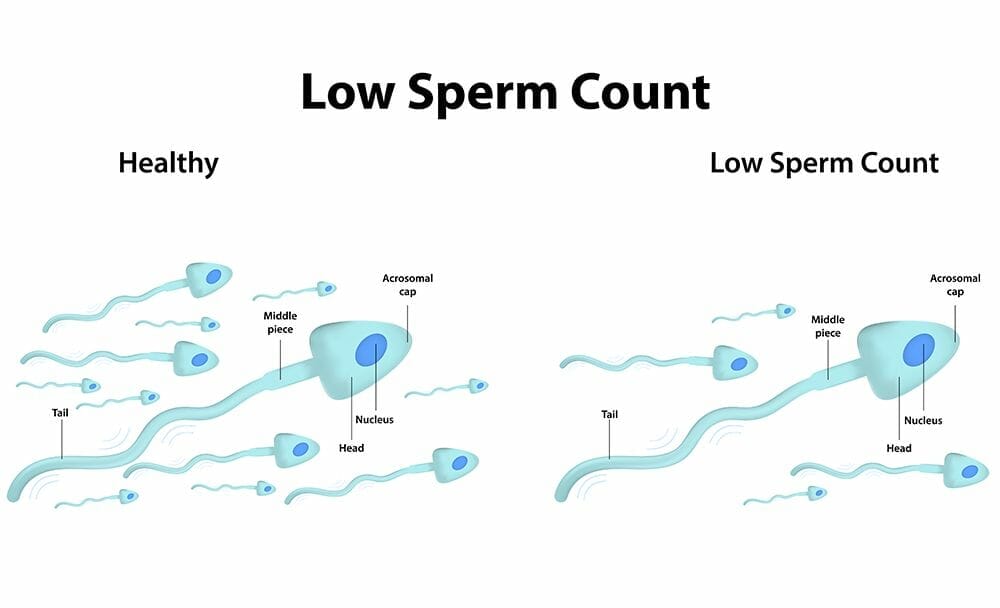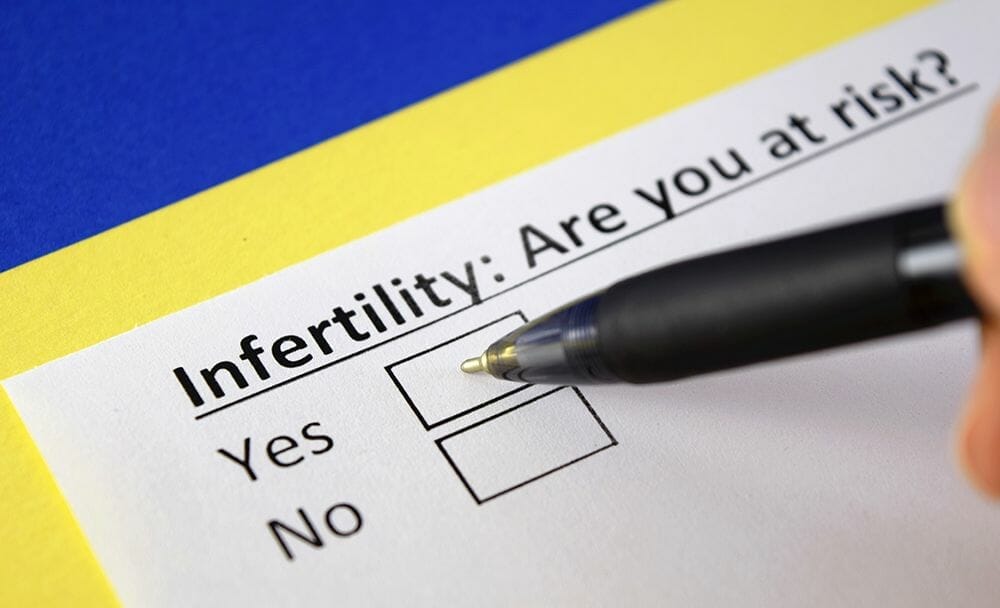
Oligospermia, commonly known as low sperm count, is a medical condition in which the semen produced by a male has an abnormally low concentration of sperm. Sperm count is an essential factor in male fertility, and low sperm count can result from a variety of factors, including infection, trauma, cystic fibrosis, and varicoceles, apart from other recent causes such as changes in lifestyle, daily routine, and nature of work. It is a quite prevalent condition affecting millions of men globally and can cause significant distress and anxiety for those trying to conceive. [1]
In this comprehensive article, we will learn what is oligospermia, its symptoms, causes, and available treatment options.
Understanding Oligospermia: Meaning

Oligospermia means a low sperm count in the ejaculated semen. A normal sperm count is defined as having a minimum of 20 million sperm cells per milliliter of semen and if a man’s sperm count falls below this threshold, he is diagnosed with oligospermia. [1]
According to Ayurveda and oligospermia meaning in Hindi, Shukra, characterized by Saumya guna and Jala Mahabhuta Pradhana dhatu, experiences Shukra kshaya due to increased pitta dosha, and motility dysfunction is attributed to vitiated vata dosha. To address these imbalances, Virechana karma, a purgative therapy, can be performed to pacify the vitiated vata and pitta doshas associated with Shukra kshaya. According to Kashyapa Samhita, Virechana karma is considered the best treatment for the vata and pitta doshas related to Shukra kshaya. This therapy not only helps in cleansing the Shukravaha Srotas but also enhances dhatwagni, leading to increased formation of new Shukra dhatu.
Symptoms of Oligospermia
Oligospermia itself does not cause any noticeable symptoms. In most cases, men with low sperm count do not experience any physical discomfort or pain. Instead, the symptoms of oligospermia are usually related to fertility issues and difficulties conceiving a child. The primary symptom of oligospermia is infertility or reduced fertility, characterized by the inability to conceive a baby after regular unprotected sexual intercourse for a year or longer. [1]
Causes of Oligospermia
There can be various underlying factors contributing to low sperm count. The common Oligospermia causes include:
- Varicocele
- Infections
- Trauma
- Cystic fibrosis
- Lifestyle factors
- Daily routine
- Nature of work
- Exposure to physical and chemical agents
- Obesity
- Addiction of alcohol
- Extreme sport (marathon training)
- Increase in the scrotal temperature due to thermal underwear, sauna or hot tube use [1]
- Genetics
- Hormonal deficiency
- Medication effects [2]
Treatment Options for Oligospermia
Oligospermia treatment depends on the underlying cause and the severity of the condition. Addressing lifestyle factors and making specific changes can significantly improve sperm count and reproductive health. Treatment options may include:
Ayurvedic treatments:
Certain procedures and drugs are used to treat the condition in Ayurveda. These include Pachana Deepana with Vaishwanara churna for Ama pachana, Agni deepana, Vatapittahara
Snehapana with Ashwagandha ghrita for Vatapitta shamana, Brimhana
Abhyanga with Balashwagandhadi taila for Vatahara, Pushtikara
Virechana karma with Trivrit lehyam for Dosha nirharana
Narasimha rasayana for Balya, Rasayana, Vrishya
Bhringarajasavam for Dhatukshaya, Vrishya, Vajeekarana
Ashwagandha churna with Cow’s milk for Balya, Rasayana, Shukrala [3]
Apart from the above-mentioned treatments, the following herbs may also be used as a solution to the issue:
Guduchi:
Guduchi is known as a Rasayana or rejuvenation therapy with immune-modulating and balya or strength-enhancing properties. Its methanolic extract has antibacterial activity and it also has a stimulatory effect on copulatory behavior, impacting both sexual excitement and execution. Guduchi also plays a significant role in regulating glucose metabolism and the expression of GLUT-5 in sperm cells, thereby affecting their motility. [1]
Amalaki:

Amalaki powder is rich in vitamin C and improves antioxidant levels in the body, enhancing semen count and motility. It is also known for its spermatogenesis purification activity, producing healthy sperm with improved morphology and motility. Amalaki supplementation can help address vitamin C deficiency in seminal plasma, potentially reducing sperm abnormalities and improving fertility. [1]
Gokshur
The Nitric Oxide in this herb acts as a biochemical marker involved in the sexual response, leading to the relaxation of smooth muscle in the erectile tissues and promoting penile erection. Ayurvedic medicinal plants like Tribulus terrestris are known to enhance sexual behavior and increase testosterone levels. It induces the production of luteinizing hormones, leading to an increase in testosterone levels and libido. It may also be effective in men with anti-sperm antibodies, potentially aiding in sperm production. [1]
Goghrut
This Ayurvedic medicine enhances luster and beauty, boosts stamina, and promotes longevity. It acts as an aphrodisiac and protects against various diseases. Its immunomodulatory and antioxidant mechanisms maintain sperm motility and spermatogenesis, ensuring the sperm’s ability to fertilize the ovum. [1]
Other measures
Administering Rasayana and Vajikarana drugs like Narasimha Rasayana, Bhringarajasavam, and Ashwagandha Churna, along with Shodhana procedures, particularly Virechana karma, can help. [3]
Non-Ayurvedic Treatments:
Medicine withdrawal
If the medical record indicates the usage of a medication from the list of drugs recognized or suspected to have negative effects on fertility, it might be prudent to consider a trial period of discontinuation for the medication, if feasible. However, any improvements in sperm parameters after discontinuing the implicated medication might take several months to become apparent.
Gonadrotropins therapy
In cases where men experience infertility alongside low levels of gonadotropins, the administration of gonadotropin therapy has the potential to bring about substantial increases in sperm production over a period of time. Noticeable enhancements in sperm output typically become evident within 3 to 6 months of commencing therapy, often resulting in successful conception for the majority of individuals undergoing treatment over a span of 1 to 2 years.
Addressing Elevated Prolactin Levels in Treatment
In instances where a man experiencing infertility is diagnosed with elevated prolactin levels, rectifying the infertility could involve bringing the serum prolactin concentration back to normal levels. In cases where elevated prolactin is attributed to a prolactin-secreting pituitary adenoma, treatment can involve the use of the dopamine agonist cabergoline.
Vitamins and Supplements
Semen from men grappling with infertility displays an increased presence of oxidative stress. This observation has prompted the use of different antioxidants as potential remedies for oligospermia. The use of Isotretinoin, an active vitamin A form, on men with oligozoospermia and infertility, has also shown promising outcomes. [2]
FAQs
How can Oligospermia be diagnosed?
1. The initial step in diagnosing Oligospermia is a semen analysis, which involves analyzing a semen sample collected through ejaculation. The sample is tested under a microscope to determine sperm count, motility (movement), morphology (shape), and other important parameters.
2. Blood tests may be carried out to measure hormonal levels, such as testosterone, LH, and FSH, to identify any hormonal imbalances.
3. A physical examination may be carried out to detect any physical abnormalities or signs of infection.
4. In certain cases, genetic testing too may be advised to identify any chromosomal abnormalities or genetic factors contributing to low sperm count.
How can Oligospermia be prevented?
1. Following a healthy lifestyle, consuming a balanced diet, doing regular exercises, and avoiding smoking and excessive alcohol consumption, can positively impact sperm count.
2. Reducing exposure to environmental toxins and harmful chemicals can help preserve sperm health.
3. Chronic stress can negatively impact the man’s hormonal balance and fertility. Getting involved in stress-reducing activities, such as yoga or meditation, can be beneficial.
4. Excessive heat exposure to the testicles can impair sperm production. Avoid prolonged hot baths or saunas to protect sperm health.
5. Protecting oneself from sexually transmitted infections (STIs) can help prevent infections that may impact fertility.
What are the various classifications of Ksheena Shukra or Oligospermia in Hindi?
1. Based on the severity of the condition, oligospermia can be further classified into:
2. Mild Oligospermia: Sperm count ranging from 10-15 million sperm per milliliter of semen.
3. Moderate Oligospermia: Sperm count ranging from 5-10 million sperm per milliliter of semen.
4. Severe Oligospermia: Sperm count below 5 million sperm per milliliter of semen.
Conclusion
Oligospermia, or low sperm count, is a common condition that can significantly impact male fertility and the ability to conceive a child. It is crucial for individuals experiencing difficulties in conceiving to seek medical evaluation and diagnosis. With proper medical assessment and appropriate treatment, many cases of oligospermia can be successfully managed, allowing couples to fulfill their dreams of parenthood. Moreover, adopting a healthy lifestyle and following preventive measures can contribute to improved sperm count and overall reproductive health, promoting fertility and well-being.
Disclaimer:
This article is written from a health and wellness perspective only and is not a piece of medical advice. Kindly seek the help of a certified medical practitioner before initiating any treatment.
References:

















